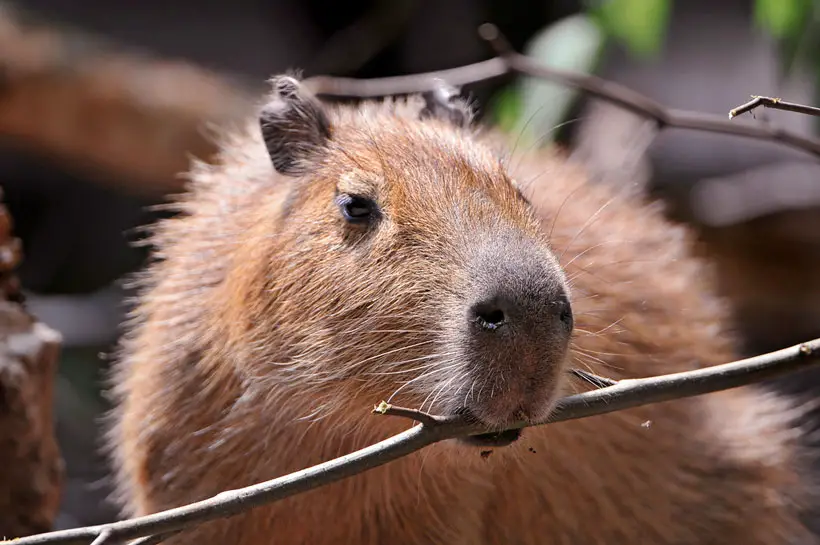Capybara Bites: Understanding the Risks of Being Bitten by These Pets
There are pets you can’t help but love for their mischief. Similarly, there are pets that we favor most for their calm and compassionate behavior. Capybaras fall into the calm category. However, you cannot expect your pet capybara to always be friendly.
So what are the consequences of getting bitten by Capybara? If you get bitten, you will generally experience fever and headache. Also, there is a higher possibility of bleeding, skin damage, muscle damage, etc.
This article aims to explore the potential dangers of Capybara bites and everything there is to know about Capybara bites.
Why Pet Capybaras Bite?
Capybaras are naturally social and friendly animals. Still, they can bite the owner under several circumstances. Below are the discussions.

Fear or Feeling Threatened
We all know that capybaras are social and friendly animals. But when you take it to a new place for the first time, it may feel threatened due to the unfamiliar surroundings. In such cases, they become defensive and bite to protect themselves.
Discomfort
Like every other animal, pet capybaras also have the natural characteristics of roaming around within the wood, swimming in the natural water bodies, etc.
Following this, if you are unable to facilitate these, the space shortage can make your pet capybara feel uncomfortable, becoming angry and biting you or others.
Loneliness
Capybaras are highly social animals and thrive in groups. Generally, they live in herds of up to 20 individuals in the wild. Therefore, pet Capybaras can experience loneliness when kept alone without any companionship. Additionally, become lethargic, depressed, or anxious.
This mental state of the capybara directs it to bite the surrounding human or other pets within the home setting.

Lack of Socialization or Training
Proper socialization and training are essential to pet a capybara. If a Capybara has yet to be socialized or trained correctly, it may become aggressive or defensive when around humans.
Protecting Their Young
Capybaras retain the highly protective characteristics of their offspring. They become aggressive towards humans if they feel their young ones are in danger. Hence, keeping a safe distance from Capybara mothers with young offspring is essential to avoid potential biting incidents.
Breeding Season

Like many other animals, capybara males also fight against other male capybaras to win the sexual companionship of a female in the breeding season.
Accordingly, male capybaras may become more aggressive toward humans during the breeding season, retaining a fighting mindset to compete for a counterpart’s companionship.
Territorial Behavior
Pet Capybaras exhibit territorial behavior if they perceive a threat to their space or if they feel their resources, such as food or water, are being threatened. They may become aggressive towards other Capybaras or even towards their owners.
Capybara Bites: Understanding the Risks of Being Bitten by These Pets

Let’s check out what health risks you are going to face if you receive a bite from your pet capybara.
- Capybaras carry a wide range of bacteria like Leishmania, Leptospira, Trypanosoma, etc. These can cause infections when transmitted through a bite wound. Consequently, the infection leads to inflammation, redness, and fever.
- Capybaras carry and transmit the rabies virus through their saliva. So, you can get rabies in case your pet capybara bites you. Rabies is a severe viral infection that can be fatal if left untreated.
- The respective skin area where you have received the bite from your pet capybara can result in bleeding, tissue damage, and scarring.
How to Avoid Pet Capybara Bites?

Below are listed approaches you can apply to discourage your pet capybara from biting.
- Go with proper socialization and training methods. The pet should be introduced to humans and other animals gradually and positively. Also, the pet should be trained to respond to commands and taught appropriate behaviors.
- Capybaras are prey animals and can become defensive and agitated if they feel threatened. Handling them gently and carefully is essential to avoid triggering their defensive instincts, i.e. restricting biting.
- You must pet two capybaras as this animal is highly oriented to live in a group. Living alone, without the presence of any other capybara, makes them lonely and depressed.
- It is essential to respect their personal space and avoid approaching them when you sense that your pet is a bit aggressive.
- Finally, continuous and consistent supervision is essential.
Check out this YouTube video to identify the sign of aggressiveness in your pet capybara;
Medicines and Treatments
Below is the list of appropriate medications and treatments for your body for Capybara bites;
| Type of impact from the bite | Medication and treatment |
| Trauma in the affected area | Localized treatment |
| Rabies | Amoxicillin/clavulanate, PPE consisting of HIRG, and visiting physician |
| Intensive wound | Medical care and Amoxicillin/clavulanate |
FAQs
Here, we answer some of the most common questions in regard to capybara bite.
Q: Why Don’t Animals Attack Capybaras?
There are two prominent reasons. First, capybaras are calm and compassionate; they do not go to harm other animals. Second, they are large and have sharp teeth, which can cause severe physical injury to the predators. Thus, other animals don’t want to mess with them.
Q: Has A Capybara Ever Killed Someone?
There is no such record indicating a capybara killed a human. However, there is a report mentioning Capybara killed a monkey.
Q: Do Capybara Bites Hurt?
Yes. Capybara bites are painful due to their sharp teeth. As per experts, capybara bite has a force of 1,400 newtons.
Final Words
Owning a pet capybara is always a great experience but hosts a bit of risk as the capybara bites. Capybaras can bite humans if they feel threatened, agitated, or perceive a threat to their space or resources. Their bites can pose several health risks, including infection, rabies, tetanus, and allergic reactions.
However, understanding the risks of being bitten by these pets can help you deal with the context effectively. Finally, we suggest you vaccinate your pet capybara to prevent contamination in case it bites you.




